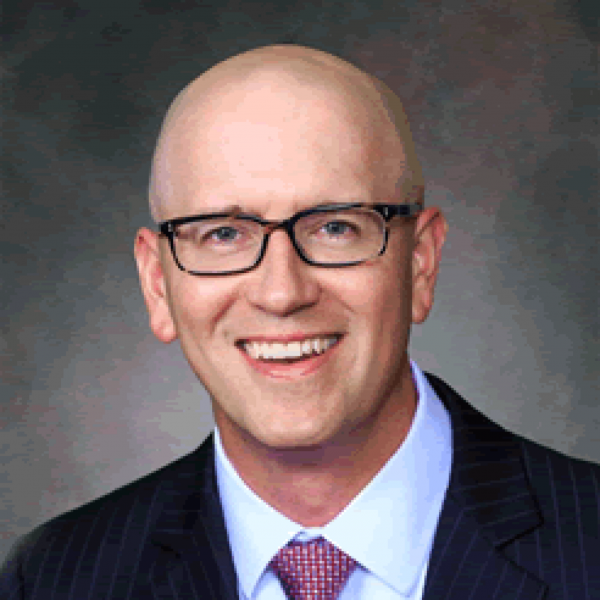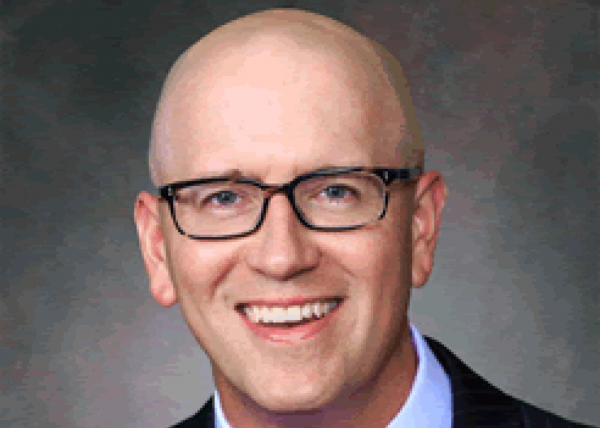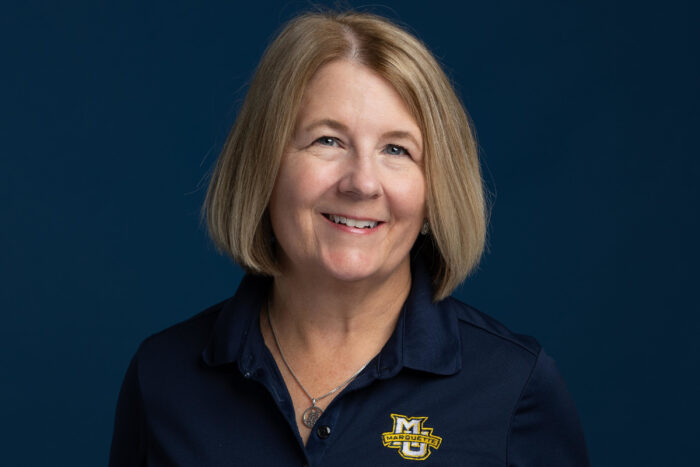Marquette Business instructor Dr. Christopher Merker shares his expertise

Dr. Christopher Merker is the lead instructor of the sustainable finance and business program in Marquette’s College of Business Administration. He is also a director of Private Asset Management at Robert W. Baird and holds a Ph.D. in investment governance and fiduciary effectiveness.

He is an industry leader, serving as executive director of Fund Governance Analytics (FGA), an ESG research partnership with Marquette, and he is a member of the CFA Institute ESG Working Group, an international committee exploring ESG standards.
Here in a Q&A, Merker shares insights on the importance of ESG, industry trends and how it aligns with Marquette’s Catholic, Jesuit mission.
Can you explain to people who have never heard of Environment, Social and Corporate Governance (ESG) what it is and why it’s important?
To explain ESG, it’s necessary to provide some context on the market.
Typically, the value of a company is based on the amount of earning power it has — how much money it’s making today and into the future. Stocks are valued moment to moment based on what traders believe these companies are worth, and that is reflected in the market value of the companies. What has changed over time is how much of that value is explained by tangible versus intangible assets. An example of an intangible asset is brand value — that is, how consumers feel about a company. Tangible assets are what the companies own: machines, factories or equipment, things that have intrinsic value.
Based on our understanding of companies today, most value is tied up in their intangible assets. It’s more about the people who are working for those companies and contributing their ideas and intellectual capital. So, it’s less of the tangible assets bringing value.
That brings us back to the question, what is ESG?
ESG is an extra financial approach to better understanding the value of our companies in the world today, and it looks at things like the environmental and social impacts of companies. It examines how they treat their workers and meet their obligations to provide good products and services to consumer markets. In addition, it looks at the governance factors. It asks how well these companies are run, and whether they are responsible corporate citizens.
When did your interest in ESG begin? How did you start working in the industry?
Marquette formed a partnership with CFA Institute 2006 to become the first CFA program partner at the undergraduate level. We created the Applied Investment Management (AIM) program, which offered the first Investment Ethics Management Society course — the first sustainable finance course ever offered in the United States — and the course I’ve been teaching since 2009. Marquette has been teaching ESG practices longer than any U.S. university.
What influenced me the most to get involved in ESG was seeing some of the crises that developed around corporate governance in the early 2000s. I started to wonder if we were having a problem in terms of social stability as it related to our markets.
I became personally interested in learning more about it, and it was perfect timing, because there was an opportunity to start teaching at Marquette. Coming in to teach corporate governance and socially responsible investing practices led to a fantastic partnership. I went on to do Ph.D. work in the governance field with Dr. Peck and other members of faculty.
You began teaching Sustainable Finance in 2009. Over the past decade, what are the biggest changes you have seen in the field and how has the course evolved to address those changes?
When I first started teaching ESG back in ‘09, nobody was really interested in the field. It was still new. In the last five years, it’s really changed. And now suddenly it’s on everybody’s radar.
If I were to show you the syllabus for the class this year compared to the first class ever taught by Dr. Peck, you wouldn’t see many differences. That’s how well designed it was from the beginning. Obviously, the content of what we cover has evolved over time. The data, information and evolution of the industry itself has been robust and rapid.
According to the CFA Institute, the COVID-19 pandemic has intensified discussions about the interconnectedness of sustainability and the financial system. Can you explain how the pandemic has affected ESG investing?
We’ve definitely seen an acceleration happen over the past two years with COVID. On the one hand, the pandemic has been very destabilizing to society, and we’ve seen those impacts in our cities and on international security. It has highlighted the interconnectedness of the world, and the dangers around that. It’s given people a heightened sense of potential risks. Witnessing how a virus can spread and its impact has led people to think about the threat of climate change impacts.
Some of it is a combination of more awareness of the risks that I think COVID has revealed, but I also think we’re responding to changes that are happening around us. People can see wildfires, droughts or coastal flooding.
What global standards did you help develop as a member of the ESG Working Group for the CFA Institute and what were the outcomes?
The intention of the CFA Institute was to come up with a set of product disclosures — , standards for investment products that would answer questions like: What is a sustainable investing product? Are you trying to impact a certain type of change in the world? Are you integrating ESG data to become a better risk managed investment? Are you trying to impact change or you trying to reduce risk?
Over that year-long collaboration we came up with a set of principles or standards to guide product investment disclosure. Those standards rolled out in May of 2021, so it’s too early to tell what the impacts have been, but a lot of what we’ve done has been informing investment regulation and securities market regulators like the SEC. We had a lot of industry and government interplay with our initial paper.
The SEC recently announced updated climate-related disclosure rules. The changes exemplify how industry standards are changing to meet ESG requirements.
How do you think ESG fits into Marquette’s mission and the curriculum of the Business school?
I think it’s absolutely a perfect alignment with the mission and values of Marquette, especially with its Jesuit underpinnings. The Catholic guidelines for investing were just updated in November, and those U.S. Conference of Catholic Bishops’ guidelines were already very much in alignment with ESG principles and practices, but this most recent iteration expanded social and environmental issues so it’s consistent with the Catholic Church.
Marquette has been a member of the Association for the Advancement of Sustainability in Higher Education for almost a decade now. I think we’ve been leading the pack for many years now, and I think that’s only going to continue.
Why are ESG metrics not commonly part of mandatory financial reporting? Do you foresee them becoming mandatory to disclose in the next few years?
The world is absolutely moving in the direction of mandatory disclosure, which is why many companies are already doing it — they know what’s coming. One part of the problem has been the lack of standardization.
Under the new administration it’s becoming clearer that it will soon become mandatory in the U.S. By executive order, all government agencies must now conform to certain practices and principles around sustainability issues, and the Department of Labor has recently been investigating requirements for pensions on carbon disclosure, so it’s sort of looming.
You have achieved many career milestones, from working on the CFA global committee to publishing your book in 2019. What accomplishments are you proudest of?
I’ve been fortunate to work with so many wonderful people who’ve been so supportive over the years. One of the things I’m most proud of is the research I’ve done with Dr. Peck, applying corporate governance principles to institutional investors. Some of that work is getting recognized; we’ve been honored to partner with the Commonfund Institute, so we’ve been able to take work that we’ve done here and use it to help organizations assess their own governance performance.
Secondly, advancing the state of sustainability education and being able to be as involved as I have been with standards through the CFA Institute has been rewarding. When I think about the number of students who have come through the same program over the past 13 years, I see every single one of them. Knowing that I’ve had some influence on people as they’re going out in the world, making choices and working to improve the profession, is pretty gratifying.
What do you hope to see within the ESG space over the course of the next 10 years, and how do you think Marquette can help drive positive change?
I’m hopeful that in the next 10 years we will start to make meaningful change. In the past decade, a greater awareness has been built; before you can come up with solutions, you must recognize a problem. Now that there is recognition, we can make better policy choices as companies, governments and consumers.
For me, it all comes back to education in terms of policy making and the choices we all make. So, working to drive meaningful change to educate this generation and start to see some progress on a multitude of issues is the goal.



